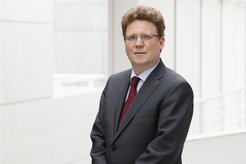“A byword for European justice”
Burkhard Hess is Founding Director of the Max Planck Institute Luxembourg for International, European and Regulatory Procedural Law. An interview with him about life in Luxembourg, the fascination of establishing a new institute and the main focal points of his research.

Professor Hess, when you were offered the post of Director at the MPI – what tempted you the most?
Two things: firstly, the excellent environment that the Max Planck Society has to offer, especially in terms of independent research, and secondly, the attractive location.
What makes Luxembourg so attractive? In the eyes of the public, isn’t the country – even though it is presently trying to shake off the label – still seen as something of a tax haven, especially for big businesses?
Appearances can be deceiving. Luxembourg is the seat of the European Court of Justice, which, together with the General Court of the European Union and the Civil Service Tribunal, forms the judicial arm of the EU’s political system. Therefore, the city plays an active role in shaping EU politics. It has become a byword for European justice, and we experience that at the Institute as well. Judges, lawyers and party representatives come to the Max Planck Institute and discuss their cases with us. It is the fact that we are close at hand that makes us attractive to them.
Of course, Luxembourg is also an important financial centre, and at the moment the German public’s perception may well be correct. But things are changing. It is also easy to forget that Luxembourg is a successful university seat of learning. The country is investing in research at a faster rate than anywhere else in the EU. And the ambitious strategic development of the university makes it an effective partner for the Institute. These factors all combine to set Luxembourg apart.
“Procedural Law matters,” proclaims the Institute brochure, almost as a leitmotif, involuntarily calling to mind the Metallica song “Nothing else matters”. Why is procedural law so important? And exactly what does the concept entail?
There’s a world of difference between being in the right and proving it. Which is why people go to law. They demand a hearing, and what they need is a court that will try their case – with speed, efficiency and justice. That is not as obvious as it first appears, and every country is different. What goes on in the minds of judges or lawyers when they talk among themselves, what form does any given country’s legal culture take? We have scientists from ten European countries working at the MPI in Luxembourg, so it is easy to ask one another: “How do you deal with this?”.
This is also reflected in our research. We study a variety of legal processes, but we also turn our attention to other modern methods of resolving disputes, such as class actions or mediation. And from a procedural point of view, we are also interested in the capital and financial market settlements negotiated, for example, through the US courts where legislation as such is lacking.
In the final phase of its development, the Institute is expected to have three departments with a staff of around 65. How far has the initial phase progressed?
In the meantime, the Institute team is comprised of around 45 employees whose sheer enthusiasm and élan are infectious. On an interim basis, we have moved into a magnificent building designed by the architect Richard Meier on Kirchberg that was built 20 years ago and belonged to a bank.
Then the gleaming white modern building on the cover of the brochure is not new?
No, the facade is “scrubbed down” each year by a team of cleaners. They dangle on ropes down the front of the building like mountain climbers. So everything looks like new. In a few years we will be on the move again, when we take possession of an old convent on Limpertsberg, a former monastery building which, when the renovations are complete, will look like an English college.
66 percent of the population of Luxembourg are foreigners who do not hold a Luxembourg passport. Are you now one of them?
Yes (he laughs)! I still have my German passport and a long-term residence permit. I also have a small apartment in the city, although currently at weekends I regularly drive back to Heidelberg where my family lives.
The interview was conducted by Susanne Beer
